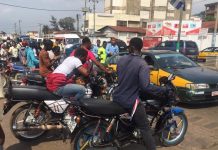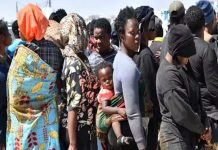By Sahr Ibrahim Komba
Every day, thousands of people in Sierra Leone leave their homes to hustle for a better life whether it’s to get to school, the hospital, the market, or their jobs. Our roads, from busy Freetown to places like Waterloo, Bo, and Kenema, are supposed to connect us. But for many drivers and passengers, these roads are more like trap zones controlled by traffic police officers who care more about money than safety.
The Sierra Leone Police traffic division is meant to help us follow the law and stay safe. But what most of us see is a group of officers who stop vehicles not to protect us, but to collect bribes. This has gotten so common that it even has a nickname: “booking.” No ticket, no receipt, just cash usually under threats like “We’ll take your license” or “We’ll impound your car. “Mostly for some ridiculous infraction like a faulty headlight in the broad daylight or failing to affix your license.
It’s sad, but it’s true. Corruption on our roads is out of control. At major checkpoints like Mile 38, Shell Junction, and Makeni; or more glaringly at Christ Church-Circular road junction, officers in uniform regularly stop drivers and demand money. Sometimes, they don’t even do it themselves they send someone in plain clothes to collect it. And most times, drivers haven’t even broken any traffic laws.
Ibrahim Bangura, a taxi driver in Freetown, told me, “I was stopped for not having a reflector in my car. The officer asked for Le100,000. I didn’t have it, so he took my license. I lost a whole day’s work.”
For drivers like Ibrahim, saying “no” isn’t an option. If they refuse to pay, they risk losing their license, getting arrested, or having their vehicle detained -things they just can’t afford.
Abubakar Kamara, a poda poda driver on the Waterloo–Bombay route, said it straight: “There are places we know we have to pay, or we’re not going anywhere. If you pay, you can do anything and the police won’t bother you. But if you don’t, they’ll make sure you can’t even move.”
He even added in Krio, “Di moment we pay am na dem strategic locations, we lef pan we own. But if you deny for pay, you nor go drive from Bombay to Waterloo.”
Even though the drivers are the ones being stopped, passengers suffer too. Theresa Kallon, a market trader from Waterloo, says it’s gotten worse over time.
“I have to pay more just to get to town. Sometimes double the fare. And some drivers stop the journey halfway because the police took their keys or vehicle for not paying.”
This means higher transport costs, delays, and even safety risks for regular citizens. Drivers pack more people into their vehicles and speed just to make up for the money lost to bribes. In the end, passengers are paying more and risking more just to move around.
A 2016 by the Institute for Governance Reform (IGR) report said traffic police collected nearly Le81 billion every year in illegal payments. That’s money that should be helping our country, not disappearing into someone’s pocket. Another survey from 2023 Afrobarometer survey further reinforced the scale of the problem showing that 71% of Sierra Leoneans think the police are corrupt, especially the traffic division.
In May 2025, a video went viral of police officers asking poda poda drivers for bribes in the middle of a rainstorm in Freetown. People were angry. But guess what? Nothing happened. No one was punished. That’s what many people say is the real problem no accountability. In 2017, Solomon Edward Yarjoh of the Sierra Leone Road Safety Authority was demoted after admitting to accepting bribes
Groups like the Centre for Accountability and Rule of Law (CARL) and Campaign for Good Governance (CGG) are speaking out. They say this isn’t about keeping order anymore it’s about making money. Some even say officers share the bribe money with their bosses. And when that happens, who’s left to report to? “This is no longer about maintaining order. It’s about profit,” said a representative from CARL. “Law enforcement has become a business, and the average citizen is the one footing the bill.”
The Anti-Corruption Commission (ACC) has tried to fight back. They’ve done sting operations and public campaigns. The police also set up internal affairs teams and made officers wear ID tags to help with transparency. Some officers have even been punished like one who got caught asking for Le500,000 to unclamp a car. But those stories are rare. Most officers get away with it.
Experts say the solution isn’t simple, but it’s possible. They suggest:
- Paying officers better, so they don’t rely on bribes.
- Going digital e-tickets, mobile payments, and body cameras can reduce illegal cash transactions.
- Letting citizens report abuse anonymously and investigating police wrongdoing fast.
- Showing the public real results, not just promises.
One analyst said, “We talk about change a lot, but very little actually happens. Until we start using technology and hold officers accountable, this won’t stop.”
For people like Theresa Kallon and Abubakar Kamara, this isn’t just about being late or losing money. It’s about dignity. It’s about safety. It’s about being able to trust the people who are supposed to protect us.
“Corruption on our roads isn’t just annoying,” Theresa said. “It’s a crisis. It’s costing us our money, our time, and sometimes, our lives.” Until systemic reforms are fully implemented and until political will matches public rhetoric Sierra Leone’s traffic police will remain not a solution to lawlessness, but a symbol of it.





